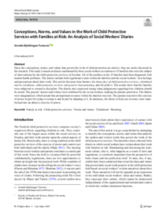Abstract
Since the conceptions, norms, and values that govern the work of child protection are elusive, they are rarely discussed in the research. This study is based on diaries maintained by three social workers in relation to 15 families that were the subject of interventions by the child protective services in Sweden. All of the mothers in the 15 families had been diagnosed with mental health problems. The diaries include both signifcant events within the families and the social workers’ own feelings and perceptions about their work. This article discusses four themes: the Janus face of child protective services, clienthood and its conditions, child protective services and good or bad parenting, and the fathers. The results show that the families were subjected to extensive discipline. The diaries also expressed strong value judgements regarding how children should be raised. The parents’ desires and wishes were redefned by the social workers, making the parents powerless. The fathers were marginalized, which meant that an important resource within the families was lost. The parents reacted to this exercise of power in part by trying to escape it and in part by adapting to it. In summary, the desire to help was in some cases transformed into an abusive exercise of power.

